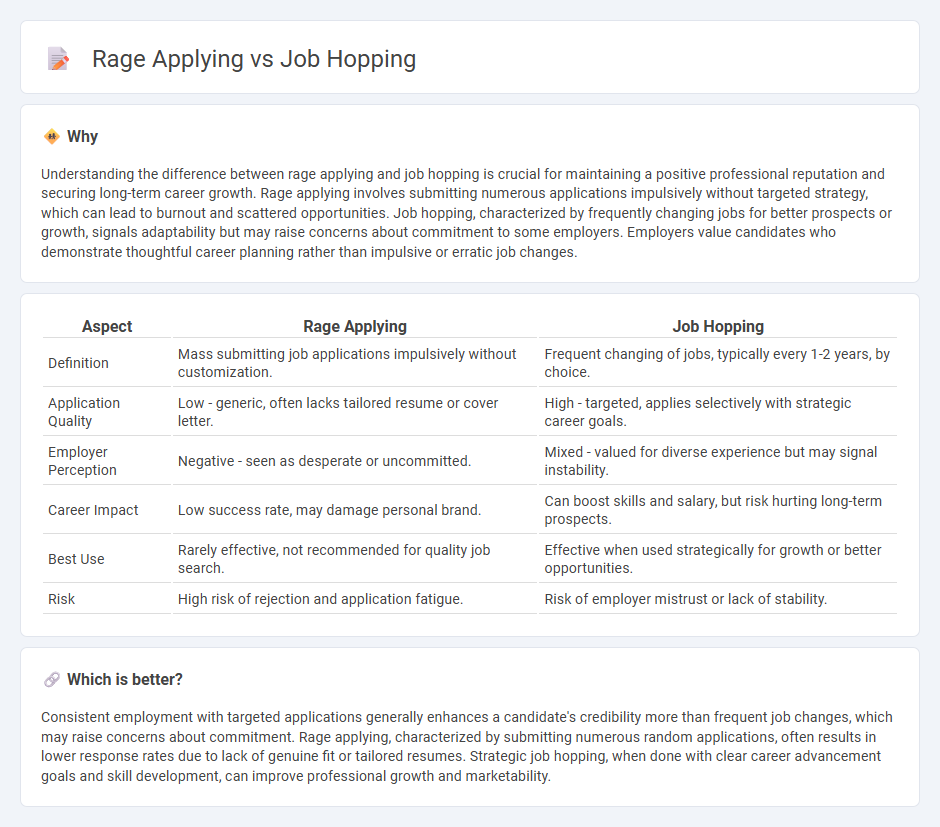
Rage applying involves submitting numerous job applications impulsively, often driven by frustration or immediate dissatisfaction, while job hopping refers to changing jobs frequently over a short period to seek better opportunities or work environments. Both behaviors impact employment stability and can influence a candidate's appeal to recruiters, with rage applying potentially causing burnout and job hopping sometimes raising concerns about commitment. Explore the advantages and disadvantages of each approach to optimize your career strategy.
Why it is important
Understanding the difference between rage applying and job hopping is crucial for maintaining a positive professional reputation and securing long-term career growth. Rage applying involves submitting numerous applications impulsively without targeted strategy, which can lead to burnout and scattered opportunities. Job hopping, characterized by frequently changing jobs for better prospects or growth, signals adaptability but may raise concerns about commitment to some employers. Employers value candidates who demonstrate thoughtful career planning rather than impulsive or erratic job changes.
Comparison Table
| Aspect | Rage Applying | Job Hopping |
|---|---|---|
| Definition | Mass submitting job applications impulsively without customization. | Frequent changing of jobs, typically every 1-2 years, by choice. |
| Application Quality | Low - generic, often lacks tailored resume or cover letter. | High - targeted, applies selectively with strategic career goals. |
| Employer Perception | Negative - seen as desperate or uncommitted. | Mixed - valued for diverse experience but may signal instability. |
| Career Impact | Low success rate, may damage personal brand. | Can boost skills and salary, but risk hurting long-term prospects. |
| Best Use | Rarely effective, not recommended for quality job search. | Effective when used strategically for growth or better opportunities. |
| Risk | High risk of rejection and application fatigue. | Risk of employer mistrust or lack of stability. |
Which is better?
Consistent employment with targeted applications generally enhances a candidate's credibility more than frequent job changes, which may raise concerns about commitment. Rage applying, characterized by submitting numerous random applications, often results in lower response rates due to lack of genuine fit or tailored resumes. Strategic job hopping, when done with clear career advancement goals and skill development, can improve professional growth and marketability.
Connection
Rage applying, the impulsive submission of multiple job applications after a frustrating experience, often leads to job hopping, characterized by frequently changing jobs in short periods. This pattern disrupts career stability and can signal instability to potential employers. Understanding this correlation helps job seekers manage their application strategies and fosters longer-term employment commitments.
Key Terms
Employee retention
Frequent job hopping and rage applying both impact employee retention by influencing organizational stability and workforce satisfaction. Job hopping often signals dissatisfaction and negatively affects retention rates, while rage applying indicates desperation or frustration, potentially leading to mismatched hires and higher turnover. Explore effective strategies to enhance employee retention and manage job-seeker behavior.
Workplace satisfaction
Job hopping often reflects a proactive approach to finding workplace satisfaction, allowing individuals to explore diverse roles and company cultures that align better with their values and career goals. Rage applying, on the other hand, can signal frustration and discontent, where candidates submit numerous applications impulsively without strategic consideration, potentially harming their professional reputation. Discover how understanding these behaviors can enhance your career strategy and workplace happiness.
Career progression
Job hopping involves strategically changing employers to gain diverse skills and faster career advancement, while rage applying is impulsively sending multiple applications without clear goals, often hindering progression. Employers value consistent growth and intentional career moves, making planned job changes more beneficial for professional development. Explore effective strategies to balance career growth and job application approaches for optimal results.
Source and External Links
Job Hopper: definition, synonyms and explanation - HeroHunt.ai - Job hopping refers to frequently moving from job to job within a short period, often seen as a lack of commitment by employers but also associated with gaining diverse skills and experiences.
What Is Job Hopping? (Plus Advantages and Disadvantages) - Indeed - Job hopping involves holding multiple jobs in a short timeframe, becoming more common today as workers seek better pay, titles, or work environments, though candidates must explain their reasons positively to hiring managers.
Job-Hopping With Intention: Pros, Cons, and Considerations - Job hopping, defined as staying about one to two years per job, may be driven by desire for challenges, career growth, or skill acquisition, but can still be viewed unfavorably by some employers.
 dowidth.com
dowidth.com